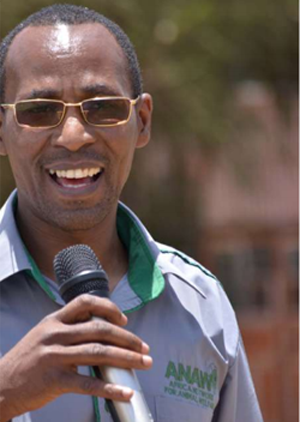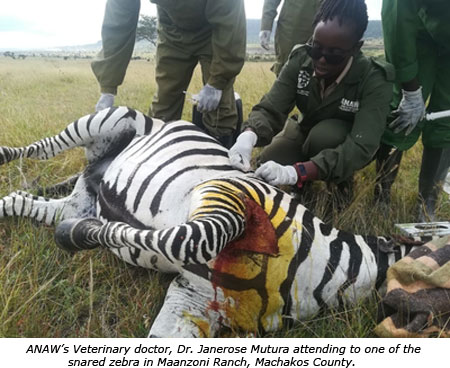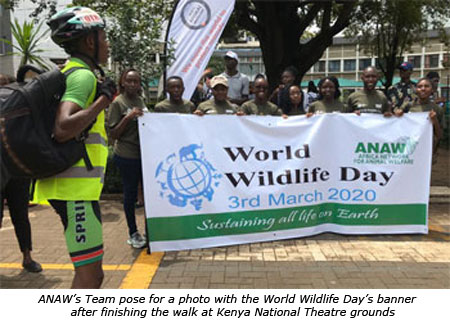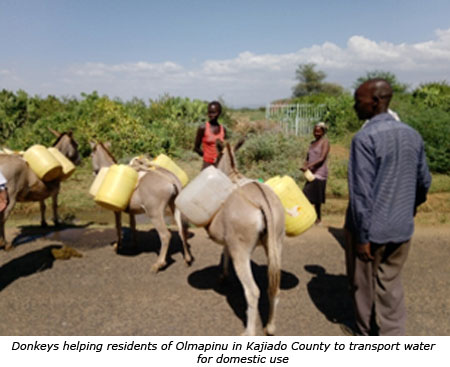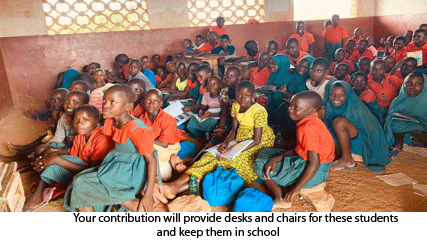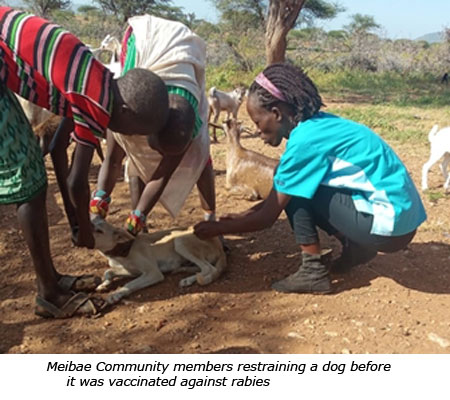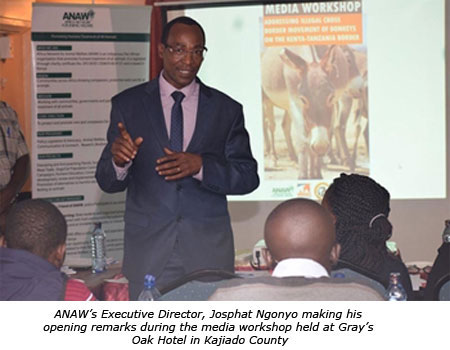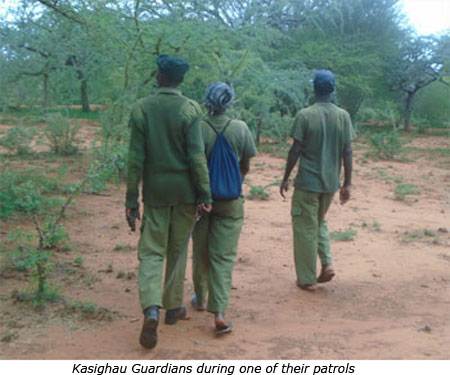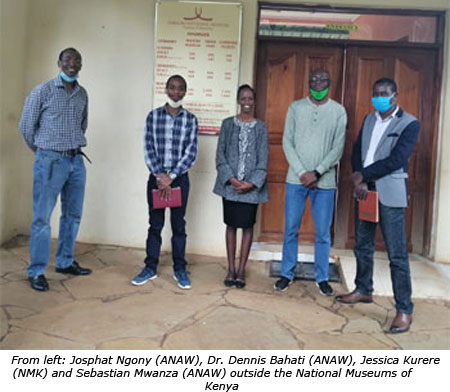January to April 2020Executive Director’s Message
At ANAW, we are aware of the reported cases of animals that have been infected with the novel virus and how they have been handled and treated, for that touches the very core for which we exist – to promote humane treatment of all animals. Our veterinary doctors are alert to offer any help in case any animal is reported to be exhibiting COVID-19 symptoms within our reach. Indeed, our head veterinary officer, Dr. Dennis Bahati recently was exclusively interviewed by a local daily to give an update of not only Kenya’s capacity to combat the virus in relation to animals but also global preparedness to handle the virus if it continued to soar. Please be keen to read that interview in this quarterly report. Despite this dampening moment occasioned by COVID-19 worldwide, and seemingly dominating the landscape, we at ANAW have not wavered even under the circumstances, in our protection and care of Africa’s animals. This edition takes you through the outcome of ongoing projects that ensure good animal care, efficient capacity building and education and peaceful human-animal co-existence. In joining the hands with wildlife conservationists across the globe to protect the lives of fast declining species, ANAW continued in its campaign to end bush meat for consumption and commercial trade by conducting routine de-snaring and rescue operations as you will read in this brief report. In celebration of our wildlife we care so much about, ANAW was keen to mobilize hundreds of animal enthusiasts and conservationists in commemorating this year’s World Wildlife Day. Care and co-existence are key as we work and live closely with animals in the wild as well as in our homes, farms and bomas. Donkeys being crucial in running the homestead, should not be subjected to abuse, pain, or torture. Wanton donkey slaughter in the country has largely decimated the animals’ population. In a joint campaign led by ANAW and The Brooke East Africa, ANAW hosted a media workshop involving 25 journalists at the beginning of the year to sensitize the media in awareness creation and educating the masses on the plight of these donkeys. Read more on how the initiative bore fruit soon after, when the Cabinet Secretary of Agriculture and Livestock, Hon. Peter Munya, instituted a ban of donkey trade and slaughter in the country. As we look out for animals, we find it important to meet the needs of human beings as well. Read through and learn about ANAW’s program to educate the youth and meet their need to ensure a good environment for learning. Studies have revealed that rural towns bordering wildlife protected areas also pose a threat to wild animals through hunting for bush meat and charcoal burning. In engaging in these activities, diseases such as rabies are easily transmitted from animals to humans. A rural community in Samburu was glad to have the threat of Rabies done away with in a vaccination campaign in Meibae Community Conservancy. See the report. I ask you to spare a few minutes and read through what ANAW has been able to achieve in these four months of the year despite the prevailing Covid-19 situation. We would also appreciate your feedback which will go a long way in helping us do more in safeguarding Africa’s animal welfare. Sincerely, |
Four Zebras Given a Chance to Live Again in Machakos and Nakuru Counties
The zebra was lying alone under an isolated acacia shrub and seemed to be writhing in excruciating pain. With the help of Kenya Wildlife Service (KWS) veterinarian Dr. Ephantus Ndambiri, the team administered proper wound management and accompanying medication to the ailing wild animal. His face beaming with joy, Njeru said to ANAW’s team, “Oh, thank God, you came, otherwise this zebra would have most likely ended up in a poacher’s plate…” They all watched the zebra shamble away to join the rest of her fold. Undeterred, on February 13, 2020 the team swiftly responded to a more serious emergency call in Soysambu Conservancy situated in Nakuru County and Kenya’s central Rift Valley approximately 130kms northwest of Nairobi. The conservancy’s head of patrols had sighted three zebras limping and dragging wire snares. The first zebra, a male had a swollen left front foot; the second also a male had a snare embedded on its rear left foot while the third, a female had a neck snare. All the three zebras were luckily darted, treated and released back to the wild. The four zebras treated were lucky enough to have leaped to join their fold in the respective ranches. Many of these wild animals are not as lucky; as poachers trap them using wire snares and skin them for commercial purposes or to feed their families. ANAW continues to put more emphasis on community awareness on the benefits of co-existing with these wildlife species and conserving them for posterity. |
World Wildlife Day Celebrated in Style
Speaking at the event, ANAW’s Chief Operations Director, Kahindi Lekalhaile reminded the enthusiastic celebrants, “We are protecting wildlife not because the world is asking us to, but because those are our values and it is the attitude we need.”. This day accords all an opportunity to celebrate the many beautiful and varied forms of wild fauna and flora and to raise awareness of the multitude of benefits that their conservation provides to people. Moreover, this special day serves a reminder to all, of the urgent need to step up the fight against wildlife crime and human-induced reduction of species, which have wide-ranging economic, environmental, and social impacts. |
Kenya Declares Slaughter and Trade of Donkeys Illegal
In December 22, 2019, a special report dubbed, #HideousBurden aired on NTV Kenya, a leading national and regional broadcaster. ANAW and Brooke East Africa had partnered with the giant media house, to investigate the nature, frequency and the extent of illegal cross-border movement and trade of donkeys across the Kenya-Tanzania border and its consequential economic effects on communities that rely on the animal for their livelihoods. When it aired, a plethora of feedback from Kenyans and Tanzanians who watched, in utter shock understood how cartels and unscrupulous businessmen were selfishly benefiting from the illegal trade and the suffering meted on communities through theft of their donkeys, to supply the aforementioned four slaughterhouses. It was after this special report and other media reports from ANAW partners that persuaded the Kenyan government to make the landmark pronouncement. The Cabinet Secretary has since published the ban in Kenya Gazette Notice to make it a government directive. |
Waatha Youth Set to Benefit from ACEF Program
It is this spirit that inspired ANAW, in February to start putting together a database of primary and high school leavers as well as youth dropouts from the Waatha community in Taita Taveta County, for them to benefit from the recently launched, ‘Africa Conservation Education Fund’ (ACEF) program. The database is intended to help the program come up with different projects that are suitable for each cadre. Moreover, the ACEF program seeks to pay for direct and indirect learning costs for children from poor families living within the Tsavo ecosystem in the county. It also seeks to provide desks, chairs, school uniform and books for 80 primary school pupils and transport for 25 younger school age children from the marginalized community. Furthermore, this noble initiative will also support vocational training for 447 unemployed youth, who apart from hunting for bush-meat and charcoal burning, have limited options for earning a means of livelihood. ANAW is making a passionate call on partners and friends to join the movement and make the ACEF program a reality thus improving the lives of the disadvantaged Taita Taveta, Kwale and Kilifi counties youth. |
912 Animals Vaccinated as 27 Others Sterilized in Samburu County
The vaccination campaign was anchored on the Strategic Plan for the Elimination of Human Rabies in Kenya 2014 – 2030. This strategy highlights Kenya’s plan and focus for the elimination of human dog-mediated rabies, an invariably fatal disease in humans, livestock, and other mammals by 2030. The viral condition kills an estimated 2,000 people in Kenya every year, and around 60,000 people annually worldwide; that is nearly one death, every nine minutes. Most affected are countries in Africa and Asia. Depressingly, almost half of the victims are children under the age of 15. |
25 Journalists from Kenya and Tanzania Sensitized on the Plight of Donkeys
The main objective of the media workshop was to sensitize the media on the nature, and impacts of the cross-border movement and illegal trade of donkeys along the Kenya-Tanzania border, hence, seek for their partnership in informing the public on the trade’s negative ramifications on communities that depend on the animal for their livelihood sustenance. One of the key outcomes of the workshop was to have an invigorated reporting of the plight of donkeys in the media. Here are some of the outcomes of the successful media workshop. 1. ANAW’s Kahindi Lekalhaile BBC Interview on the closure of donkey trade and abattoirs - https://www.youtube.com/watch?v=4LB6pjqheG0 . |
Kasighau Ranch Wildlife, Not Thirsty!
|
Is the World Unprepared for Coronavirus in Animals?As the world is currently engaging in concerted efforts to combat Covid-19 which allegedly originated in Wuhan – China in early December 2019 and blistered its way around the globe. Over five million people have tested positive and over 350,000 lives lost globally due to the virus. Cases of animals both domestic and wild infected with the novel virus have been reported and although, infectious disease experts and multiple international and domestic human and animal health organizations agree there is no evidence at this point to indicate that pets spread COVID-19 to other animals, including people, that assessment might require urgent review as human transmission of the virus continue to soar. According ANAW’s Programs Manager in-charge of Animal Care, Dr. Dennis Bahati who gave an exclusive interview to Kenya’s People Daily Newspaper recently, hinted that with the vast spread of the virus in humans, the potential for spread in both domestic animals and wildlife was impending. “The already reported cases give an indication of how rapid the virus can transmit among domestic and wildlife population in captivity and in the wild if the virus were to enter their population. Imminent interactions among humans, livestock and wildlife will likely result in the transmission of the virus to wildlife if measures are not put in place.” He said. On the capacity to combat the virus if more animals were affected globally, Dr. Bahati opined, “Considering this is a novel infection whose epidemiology, pathogenesis, pathology and mode of treatment (since no known human vaccine has been developed to build natural immunity and hence counter the infection) are still a mystery, the situation may prove catastrophic if a vast population of animals, both domestic and wildlife gets infected.”. On handling of pets at home and animals in zoos during this period, it is important for the owners to wash their hands before and after handling them and their food, as well as practising good animal and pet hygiene. Moreover, pet owners should wear protective facial masks when in contact with their pets and help reduce interaction with other pets that may be carriers of the virus. They should also consult their veterinarian if their pets show symptoms consistent with Covid -19. “However, social distancing between pets and owners may prove detrimental to pets, resulting in lack of stimulation and subsequent stereotypic behaviour.” Dr. Bahati cautioned. |
ANAW Assesses the Welfare of Reptiles Within National Museums of Kenya
Through ANAW’s in-depth discussions with NMK during the guided tour, it was also noted that there was a need of enhancing reptile enrichment of their cages or rooms, to evade stereotypic and abnormal behavior. This would maximize psychological welfare and ensure that their well-being is upheld. Importantly, ANAW identified a gap within the facility; lack of a resident veterinary doctor who would handle full time animal care and welfare of the reptiles caged and agreed to continue engaging with NMK to jointly find a long lasting solution – procure a resident veterinary doctor. In his vote of thanks, Mr. Otieno said, “Thank you so much ANAW for paying us a visit to find out how we are doing. And yes, we all agree on the importance of having a resident veterinary doctor in this facility who would be on standby to attend to the reptiles whenever they need help…” He further went on to make an appeal, “Lack of sufficient resources has been our greatest impediment to procuring an in-house veterinary doctor. We would appreciate if you would help us get one for the sake of the animals’ welfare.” . |

